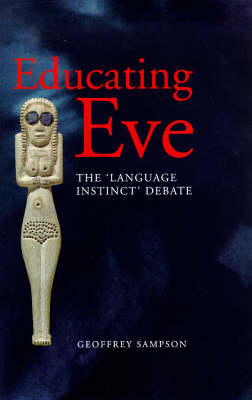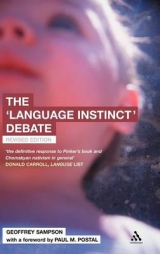
Educating Eve
Language Instinct Debate
Seiten
1999
Continuum International Publishing Group Ltd. (Verlag)
978-0-304-33908-2 (ISBN)
Continuum International Publishing Group Ltd. (Verlag)
978-0-304-33908-2 (ISBN)
- Titel ist leider vergriffen;
keine Neuauflage - Artikel merken
Zu diesem Artikel existiert eine Nachauflage
Poses questions about the nature of human mental development - does it depend on instinctive structures of thought, or can humans produce new ideas in response to an unpredictable environment? This book discusses arguments by Steven Pinker, Noam Chomsky and others, to support the latter view.
This is a study which poses questions about the nature of human mental development - does it depend on instinctive structures of thought, or can humans produce new ideas not based on biologically-fixed themes? This book discusses arguments by Steven Pinker, Noam Chomsky and others, in order to support the latter view. Steven Pinker's book "The Language Instinct" maintains that language is heard-wired in our genes. Others argue that this also holds for much of the specific knowledge and understanding expressed in language. When the first human Eve evolved from pre-human apes (it is claimed), her biological inheritance comprised not just a distinctive anatomy, but a rich structure of cognition. Sampson finds that these arguments, some depending on earlier contributions by writers such as Noam Chomsky, rest on false premises, or embody a logical fallacy. His theory is that what mankind inherits genetically is not specific structures of language and understanding, but a very general ability to produce new ideas in response to an unpredictable environment. We are born knowing nothing, but able to learn anything.
This is a study which poses questions about the nature of human mental development - does it depend on instinctive structures of thought, or can humans produce new ideas not based on biologically-fixed themes? This book discusses arguments by Steven Pinker, Noam Chomsky and others, in order to support the latter view. Steven Pinker's book "The Language Instinct" maintains that language is heard-wired in our genes. Others argue that this also holds for much of the specific knowledge and understanding expressed in language. When the first human Eve evolved from pre-human apes (it is claimed), her biological inheritance comprised not just a distinctive anatomy, but a rich structure of cognition. Sampson finds that these arguments, some depending on earlier contributions by writers such as Noam Chomsky, rest on false premises, or embody a logical fallacy. His theory is that what mankind inherits genetically is not specific structures of language and understanding, but a very general ability to produce new ideas in response to an unpredictable environment. We are born knowing nothing, but able to learn anything.
Culture or biology?; the original arguments for a language instinct; the debate is renewed; linguistic structure turns "Queen's Evidence"; the evidence for linguistic theories; a hermetic manuscript; biology and knowledge; creative evolution.
| Erscheint lt. Verlag | 31.12.1999 |
|---|---|
| Reihe/Serie | Open Linguistics S. |
| Zusatzinfo | notes, index |
| Verlagsort | London |
| Sprache | englisch |
| Gewicht | 408 g |
| Themenwelt | Geisteswissenschaften ► Philosophie ► Sprachphilosophie |
| ISBN-10 | 0-304-33908-3 / 0304339083 |
| ISBN-13 | 978-0-304-33908-2 / 9780304339082 |
| Zustand | Neuware |
| Haben Sie eine Frage zum Produkt? |
Mehr entdecken
aus dem Bereich
aus dem Bereich
Aspekte einer Ontologie des Logos
Buch | Hardcover (2024)
Springer Fachmedien (Verlag)
CHF 167,95
Wie die Menschheit zu ihrer größten Erfindung kam
Buch | Softcover (2022)
C.H.Beck (Verlag)
CHF 25,20
Macht und Legitimität politischer Sprache im Prozess der europäischen …
Buch | Softcover (2023)
Nomos (Verlag)
CHF 103,60



